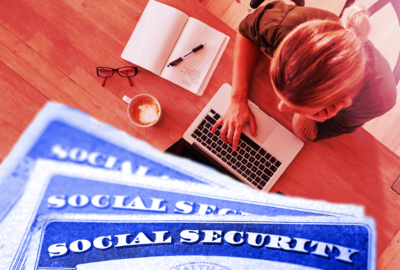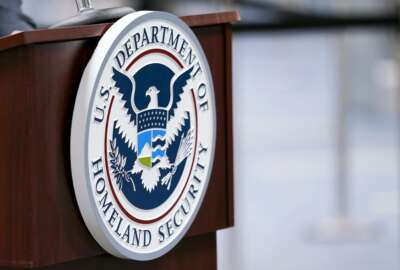DHS plans to temporarily waive some REAL ID requirements for state-issued mobile driver’s licenses
DHS said it doesn't want to stand in the way of people who are using their mobile driver's licenses at airports or for other federal agency purposes.
The Department of Homeland Security is planning to temporarily waive some federal requirements for agencies accepting state-issued mobile driver’s licenses in a bid to help reduce burdens on the public as more states roll out the digital identification.
The forthcoming DHS regulations are highlighted in the White House Office of Information and Regulatory Affairs 2023 report on the Biden administration’s burden reduction efforts.
The report details DHS efforts over the past year to reduce 21 million burden hours on the public. That goal was achieved through multiple initiatives, including the Transportation Security Administration allowing transportation workers to apply for their security credentials online and the Federal Emergency Management Agency modernizing its National Fire Incident Reporting System.
“In addition to these examples, DHS is also anticipating and addressing potential burdens that members of the public might face, as exemplified by rulemaking around mobile drivers licenses,” the White House report states.
It points to how at least eight states have already starting issued mobile driver’s licenses to their residents, while three more states are in pilot stages with the technology. The digital IDs have been developed to be stored and presented on smartphones or smartwatches as part of their secure digital wallets.
“The fast rise of state-issued mDLs thus presented potential challenges for the federal government,” the OIRA report states. “mDL technology is new and evolving, and both states and the general public have been eager to adopt mDLs.
Under the REAL ID Act of 2005, federal agencies are not allowed to accept a state-issued driver’s license or identification card, including a mobile license, for official purposes unless the ID complies with REAL ID ACT requirements.
DHS late last year announced plans to push back full enforcement of the REAL ID requirements until May 2025. The REAL ID deadline has been pushed back multiple times within the last decade.
But a lack of REAL ID standards around mobile driver’s licenses, specifically, could potentially cause “undue burden and confusion” for people using digital IDs, the OIRA report contends, as the technology continues to quickly develop across states.
“In the absence of updated federal regulations, individual states may waste time and resources choosing mDL safeguards that fail to meet REAL ID security requirements,” the White House report states.
“Responding to this potential burden, DHS is developing a proposed regulation that would enable DHS to issue to states a temporary waiver of certain REAL ID regulatory requirements that would allow federal agencies to accept state-issued mDLs that meet certain security and data integrity requirements,” it continues.
TSA is already accepting mobile driver’s licenses from TSA PreCheck passengers in some locations under a pilot project started in 2022. TSA’s website shows at least 24 airports in four states now accept state-issued mobile driver’s licenses from some PreCheck passengers for “limited test and evaluation purposes.”
DHS last month also began soliciting proposals to develop “Privacy Preserving Digital Credential Wallets & Verifiers” technologies.
Technology industry trade groups and digital identity advocates have urged the Biden administration to help accelerate the deployment of state-issued mobile driver’s licenses. In an April 2022 letter to White House officials, several groups urged them to focus on mobile driver license standards and use cases as part of an anticipated executive order on identity theft.
“A number of states have started to introduce mDL apps that allow someone to effectively prove their identity with a digital app rather than a plastic ID card,” the letter states. “Congress passed a law in 2020 giving physical and digital IDs legal equivalency under the REAL ID Act. However, early use cases are focused on in-person use cases such as proving identity to the TSA at airports, whereas the most urgent problems mDLs can solve are focused in the digital world.”
While that executive order has yet to materialize, more recently a similar coalition of groups urged the White House to focus on digital identity in its implementation of the new national cyber strategy. The groups in their June 12 letter specifically suggested having the National Institute of Standards and Technology work on mobile driver’s license technology standards.
“We believe that mDLs, if appropriately designed, may be the single best way to give Americans tools that they can use to protect themselves from identity thieves,” the groups wrote. “However, we believe it is important that privacy, security, civil liberties, equity, accessibility, and interoperability are not only ‘encouraged,’ but that the government takes proactive steps to ensure they are all achieved.”
Privacy and civil liberties groups have express concerns, however, around the introduction of digital IDs, including mobile driver’s licenses.
In 2021 comments submitted to DHS regarding proposed minimum standards for mobile driver’s licenses, the American Civil Liberties Union, the Electronic Frontier Foundation and the Electronic Privacy Information Center suggested digital IDs would make ID checks “more frequent in American life.”
They specifically raised concerns about DHS’ proposal at the time to layer REAL ID requirements into mobile driver’s license standards.
“REAL ID has many privacy problems, which should not be carried over into mDLs,” the groups wrote. “Moreover, if a person had an mDL issued by a state DMV, that would address forgery and cloning concerns, without the need for REAL ID and its privacy problems.”
Copyright © 2025 Federal News Network. All rights reserved. This website is not intended for users located within the European Economic Area.
Follow @jdoubledayWFED






